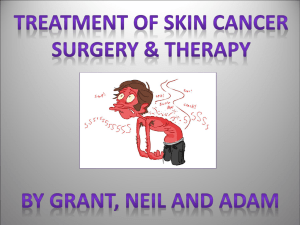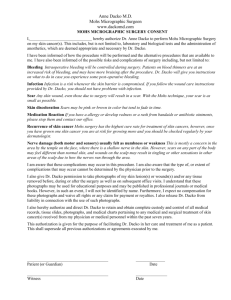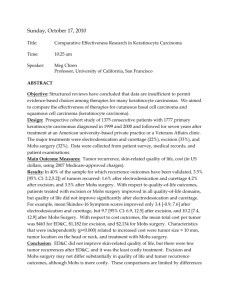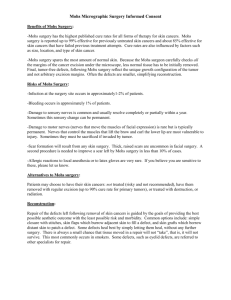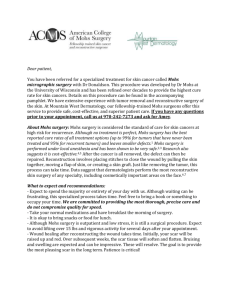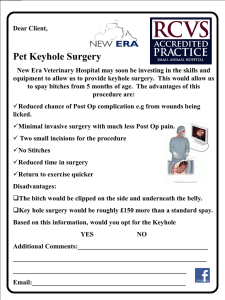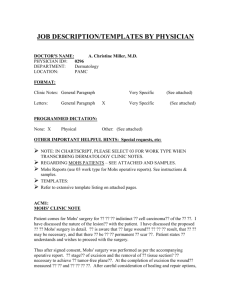Dear patient, You have been referred for a specialized treatment for
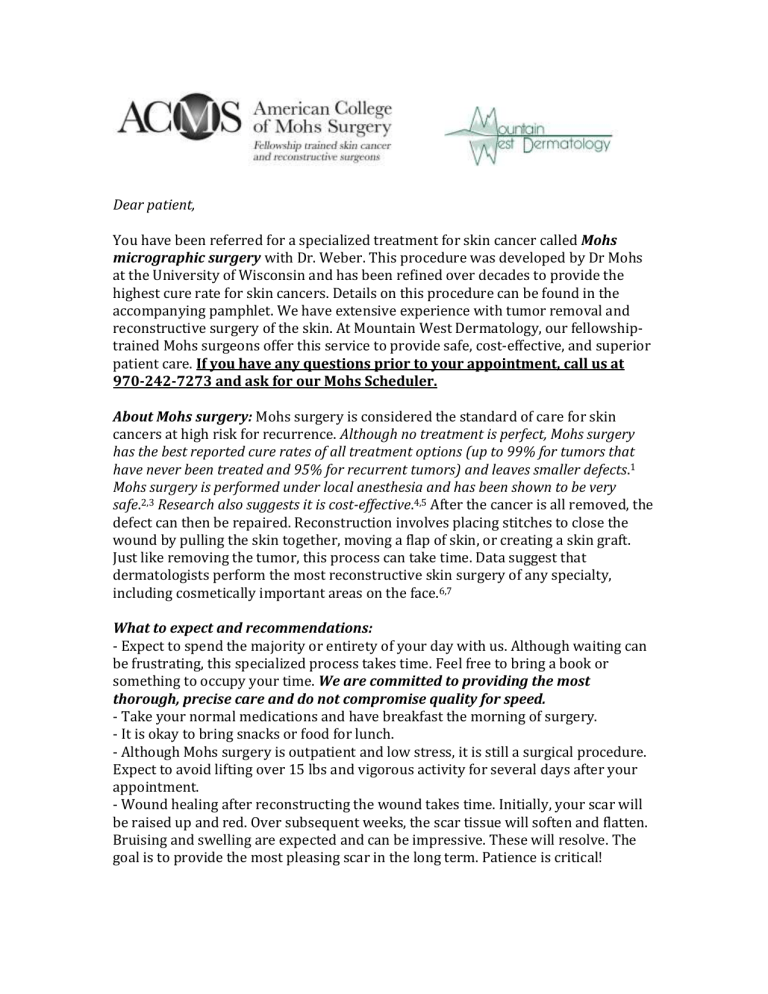
Dear patient,
You have been referred for a specialized treatment for skin cancer called Mohs
micrographic surgery with Dr. Weber. This procedure was developed by Dr Mohs at the University of Wisconsin and has been refined over decades to provide the highest cure rate for skin cancers. Details on this procedure can be found in the accompanying pamphlet. We have extensive experience with tumor removal and reconstructive surgery of the skin. At Mountain West Dermatology, our fellowshiptrained Mohs surgeons offer this service to provide safe, cost-effective, and superior patient care. If you have any questions prior to your appointment, call us at
970-242-7273 and ask for our Mohs Scheduler.
About Mohs surgery: Mohs surgery is considered the standard of care for skin cancers at high risk for recurrence. Although no treatment is perfect, Mohs surgery
has the best reported cure rates of all treatment options (up to 99% for tumors that
have never been treated and 95% for recurrent tumors) and leaves smaller defects.
1
Mohs surgery is performed under local anesthesia and has been shown to be very
safe.
2,3 Research also suggests it is cost-effective.
4,5 After the cancer is all removed, the defect can then be repaired. Reconstruction involves placing stitches to close the wound by pulling the skin together, moving a flap of skin, or creating a skin graft.
Just like removing the tumor, this process can take time. Data suggest that dermatologists perform the most reconstructive skin surgery of any specialty, including cosmetically important areas on the face.
6,7
What to expect and recommendations:
- Expect to spend the majority or entirety of your day with us. Although waiting can be frustrating, this specialized process takes time. Feel free to bring a book or something to occupy your time. We are committed to providing the most
thorough, precise care and do not compromise quality for speed.
- Take your normal medications and have breakfast the morning of surgery.
- It is okay to bring snacks or food for lunch.
- Although Mohs surgery is outpatient and low stress, it is still a surgical procedure.
Expect to avoid lifting over 15 lbs and vigorous activity for several days after your appointment.
- Wound healing after reconstructing the wound takes time. Initially, your scar will be raised up and red. Over subsequent weeks, the scar tissue will soften and flatten.
Bruising and swelling are expected and can be impressive. These will resolve. The goal is to provide the most pleasing scar in the long term. Patience is critical!
Frequently asked questions:
I have an artificial hip or heart valve, do I need antibiotics?
- Based on recent recommendations from the American Heart Association and American Academy of Orthopedic Surgeons, we usually give antibiotics before surgery if the site is actively infected or involves the inside of the mouth or inside the nose.
8 If you have questions or concerns about your situation, please call.
I take blood thinners, do I need to stop them before surgery?
-If you have had a serious condition such as HEART ATTACK, STROKE, or
BLOOD CLOT, you may stay on your blood thinners. Data suggest it is more dangerous to stop Coumadin, Plavix, or aspirin if they are medically necessary than the bruising or bleeding they may cause during Mohs surgery.
9,10 We can safely handle any minor increase in oozing during this procedure. We just ask that you notify us ahead of time. If you take Coumadin (warfarin), make sure you have had an
INR (the blood level they check) within the last 3 weeks and that the results are forwarded to us (fax number 970-241-2878). Again, if you have questions, call!
I have a pacemaker/defibrillator or am on oxygen, is this a problem?
-Just be sure we know. This shouldn't interfere with our ability to do Mohs. If you require oxygen, be sure to bring enough for the entire day.
Why does the procedure take so long?
- After you have been put in a surgical room, we will numb up the region to be removed with local anesthetic. The tumor is then excised with a small margin and sent to the laboratory located here in our office. There, the tissue is processed, stained, and carefully examined. We evaluate 100% of the margins. Depending on the day and how much tissue is being examined, this process takes at least 1 to 2 hours per layer. While waiting for results, you can stay in your room or wait in the designated Mohs waiting room. If there is still tumor at the margins, we will take another layer of skin out and send it back to the lab. There will be another waiting period until we have results. This process continues until the margins are clear.
Should someone come with me?
-Whenever possible, yes. Bandaging can interfere with glasses or field of vision and can make driving difficult. Surgery can be intimidating and it is helpful to have someone for moral support and an extra set of ears to process information.
Will I have to come back?
-Sutures are generally removed 1-2 weeks after surgery in our office. We will usually see you 2 months after your Mohs to make sure the wound is healing properly.
Why did I get this cancer?
- Risk factors for skin cancer include genetics (fair skin and light eyes) as well as sun exposure. Tumors can arise years or decades after the sun damage was received.
What happens if I don't have my skin cancer treated?
- Skin cancer will continue to enlarge and cause local destruction if left untreated. Tumors may start to bleed, become infected or painful, and can invade deeper structures such as muscle and bone. For some tumors this may be gradual, others may grow very rapidly. There is no way to predict how your tumor will act.
We recommend definitive treatment to prevent growth, invasion, or spread.
Although metastasis of skin cancer is unusual, this is far more likely for large, neglected tumors. The earlier the skin cancer is treated, the smaller the defect tends to be. This is easier on you and us.
Will my cancer come back or spread?
-Mohs surgery has the best reported cure rates of any treatment. Recurrence is possible but unlikely. You are more likely to get a new, totally unrelated skin cancer at another site. With the exception of some aggressive squamous cell carcinomas and rare tumors, most non-melanoma skin cancers stay local.
Cancellation Policy.
-If you No-Show for a surgery appointment without prior notice, you may be dismissed from the practice. Any co-pays or deposits will be refunded upon dismissal.
Mission Statement of the Mohs team at Mountain West Dermatology:
1) To provide the highest quality, cost-effective treatment for skin cancer.
2) To put patient safety and comfort first.
References:
1. Martinez JC et al. The management of melanoma and nonmelanoma skin cancer: a review for the primary care physician. Mayo Clin Proc. 2001;76:1253-65.
2. Merritt BG et al. The safety of Mohs surgery: A prospective multicenter cohort study. J Am Acad Dermatol. 2012; 67;1302-9.
3. Asadi-Kimyai A et al. The incidence of major complications from Mohs micrographic surgery performed in office-based and hospital-based settings. J Am Acad
Dermatol. 2005;53:638-34.
4. Mudigonda T et al. The economic impact of non-melanoma skin cancer: a review. J Natl Compr Canc Netw. 2010;8:888-96.
5. Ravitskiy L et al. Cost analysis: Mohs micrographic surgery. Dermatol Surg. 2012;38:585-94.
6. Donaldson MR et al. Dermatologist perfom majority of cutaneous reconstructions in the Medicare population: numbers and trends from 2004 to 2009. J Am Acad
Dermatol. In press.
7. Roenigk RK. Dermatologists perform more skin surgery than any other specialist: implications for health policy, graduate and continuing education. Dermatol Surg.
2008;34:293-300.
8. Wright TI et al. Antibiotic prophylaxis in dermatologic surgery: advisory statement 2008. J Am Acad Dermatol. 2008;59:464-73.
9. Alcalay J et al. Controversies in perioperative management of blood thinners in dermatologic surgery: continue or discontinue? Dermatol Surg. 2004;30:1091-4.
10. Otley CC. Continuation of medically necessary aspirin and warfarin during cutaneous surgery. Mayo Clin Proc. 2003;78:1392-6.
Mountain West Dermatology, PC
2655 Little Bookcliff Dr
Grand Junction, CO 81501
(970) 242-7273
